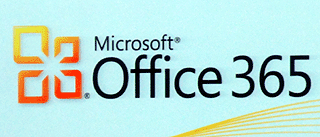Microsoft Office 365: One-Stop Shopping for Desktop and Web Productivity
By Harry McCracken | Tuesday, October 19, 2010 at 10:04 am
 At an event in San Francisco this morning, Microsoft announced something called Office 365. It’s less of a new product or service and more of an attempt to make it easy for businesses of all sizes to offload IT infrastructure and acquire the Microsoft productivity applications and services they want on a pay-as-they-go basis. (It’s the successor to an existing offering called the Business Productivity Office Suite.)
At an event in San Francisco this morning, Microsoft announced something called Office 365. It’s less of a new product or service and more of an attempt to make it easy for businesses of all sizes to offload IT infrastructure and acquire the Microsoft productivity applications and services they want on a pay-as-they-go basis. (It’s the successor to an existing offering called the Business Productivity Office Suite.)
Office 365’s components include Outlook and a hosted version of the Exchange server, a hosted version of the Lync unified communications server, hosted Sharepoint, the Office Web Apps, and the full-blown Office Pro Plus suite in its traditional desktop form. New Web-based tools will aim to make it easy to sign up for 365 and manage its various bits and pieces in one place. The company is beta-testing the service now and plans to fully roll it out next year.
Plans start at $2 a month for a basic e-mail account aimed at employees who aren’t otherwise users of productivity software. A small business might pay $6 a month for a version with the Office Web Apps and hosted Exchange, SharePoint, and a basic edition of Lync–but no desktop software, and “community” support rather than a lot of help from Microsoft itself. Versions top out at $24 a month for a one with everything, including the full version of Office and integrated voicemail.
The new offering is obviously aimed in part at answering Microsoft’s competition from Google Apps, a fully cloud-based competitor to much, though not all, of the software and services that make up Office 365. As the launch event, Microsoft made reference to unspecified competitors who are “consumer” companies which force a one-size-fits-all solution on companies that actually have widely varying needs. Office 365 is designed to be deployed in different ways by different organizations at different price points. And although nobody from Microsoft said so directly, the company implied that it’s meant to let companies do business only with Microsoft, rather than using both Google Apps (for users with light needs) and Office (for those who want stuff like full-blown Excel, Outlook, and the other Office apps).
It all makes sense as an attempt by Microsoft to leverage its greatest strength–the fact that it does both traditional software and Web services and offers as close to a comprehensive set of productivity products as any one company on the planet. Office 365 doesn’t fully address Google Apps as a challenge, though. For one thing, Google Apps’ pricing starts at $0 a month for the basic edition, a deal available to organizations with fifty or fewer users. (You could cobble together a free Microsoft alternative using the Office Web Apps and Hotmail, but Microsoft’s free services are aimed at consumers, not businesses.)
For another, the Office Web Apps remain pretty thin at this point. For some companies, paying $6 a user per month for hosted Exchange and SharePoint will be well worth it all by itself–earlier Microsoft cloud-based e-mail offerings cost more and had a higher minimum number of users. (With 365, even a one-person company could sign up.) But if the same deal will get a lot more appealing if it eventually involves a more mature and well-rounded Web-based version of Office. And the versions of 365 that include access to desktop Office are aimed at big companies, not little guys.
After the event, I spoke with Chris Capossela, a senior vice president in Microsoft’s Office group. He said that the company doesn’t expect any small outfits at all to dump the traditional Office suite in favor of Office 365’s Web-based offerings: They’ll still use desktop software too, and Microsoft will let them buy and download Office from within 365. But he said that Microsoft has found that small businesses who buy desktop software are more interested in paying a one-time price than purchasing it as a service.
In other words, while Microsoft may be rolling out 365 in part to appeal to businesses that might other be interested in Google Apps, it doesn’t represent any fundamental shift in the company’s philosophy about desktop software, Web services, and the relationship thereof.
Microsoft says that Office365.com will have more information on all this starting at noon PT today. (Right now, there’s a page there from an Australian company explaining that it’s registered the domain for “one of the world’s top brands.)
1 Comment
Read more:













October 20th, 2010 at 5:58 am
My business works out being fairly cloud based and there are good things about service based software but I got to tell you: owning your own software and data is more valuable in my personal opinion: Then you control your data; not strangers.